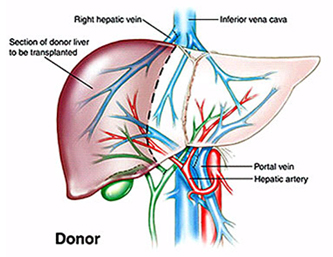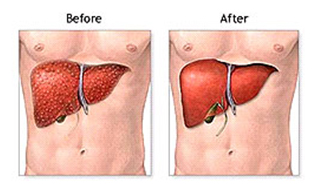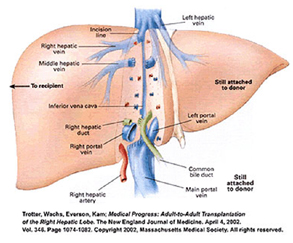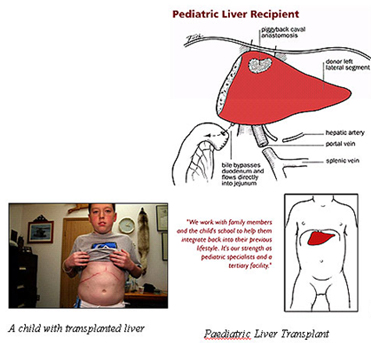Liver Transplant India offers information on Liver Transplant in India, Liver Transplant cost India, Liver Transplant hospital in India, Delhi, Mumbai, Chennai, Hyderabad & Bangalore, Liver Transplant Surgeon in India
Liver Transplant
Who Needs a Transplant
Pre Transplant Evaluation
Rejection
Living With a Transplant
Live Donor Liver Transplant
Childrenís Liver Transplant
LIVER Transplant
 Liver damage from cirrhosis cannot be reversed, but treatment can stop or delay further progression and reduce complications. Treatment depends on the cause of cirrhosis and any complications a person is experiencing. Regardless of the cause of cirrhosis, it is essential that every patient avoid all substances, habits and drugs that may further damage the liver or cause complications or liver failure.
Liver damage from cirrhosis cannot be reversed, but treatment can stop or delay further progression and reduce complications. Treatment depends on the cause of cirrhosis and any complications a person is experiencing. Regardless of the cause of cirrhosis, it is essential that every patient avoid all substances, habits and drugs that may further damage the liver or cause complications or liver failure.
Alcohol, in addition to causing cirrhosis, may accelerate the progression of liver scarring. All patients with liver disease should not drink any alcohol. Medications also may be given to control the symptoms of cirrhosis.
Q. Who Needs a Liver Transplant ?
Medical treatment for liver diseases and liver damage is always the first choice of therapy. The only reason to perform a liver transplant is that all other forms of treatment have been unsuccessful, and the patient's liver can no longer support life. This is called end stage liver disease.
 Liver Transplant
Liver Transplant
There have been over 60 different liver diseases treated with liver transplantation. However, there are several conditions that are more commonly treated with this procedure. They are frequently conditions that cause chronic or continuing liver inflammation. As the inflammation heals, fibrous tissue forms, much like a scar forms when a cut in the skin heals. Severe and advanced scarring of the liver is called Cirrhosis. Cirrhosis is not reversible and leads to end stage liver disease
Pre-Transplant Evaluation
Pre transplant tests are done to evaluate the severity of the liver disease. Once this initial evaluation is complete, the case is presented to a review committee of physicians and other staff members of the hospital.
A living donor / recipient may undergo some of the following tests before the transplantation : -
- CT scan of the abdomen : - This is a computerized picture of the liver that allows the doctor to determine the liver size and to identify any abnormalities, including liver tumors, which may interfere with the success of a liver transplantation.
- Ultrasound of the liver : - This is a study that uses sound waves to create a picture of the liver and the surrounding organs. It also determines how well the blood vessels that carry blood to and from the liver are working.
- ECG : - Short for electrocardiogram, this is a study that shows the electrical activity of the heart.
- Blood tests : - These include blood type, blood cell count, blood chemistries, and viral studies.
- Dental clearance : - A personís regular dentist may fill out the form. Immunosuppressive medications may affect the teeth; therefore, a dental evaluation is important before beginning these medicines.
- Gynecological clearance : - The patient's gynecologist may provide clearance.
- Purified protein derivative (PPD) skin test : - The PPD test is performed on the arm to check for any exposure to tuberculosis
Rejection
Rejection is a normal reaction of the body to a foreign object. When a new liver is placed in a person's body, the body sees the transplanted organ as a threat and tries to attack it. The immune system makes antibodies to try to kill the new organ, not realizing that the transplanted liver is beneficial. To allow the organ to successfully live in a new body, medications must be given to trick the immune system into accepting the transplant and not thinking it is a foreign object.
Preventing rejection : - Home care also involves taking several medications to help the liver survive and to prevent the patient's own body from rejecting the new liver. A person with a new liver must take medications for the rest of his or her life. The immune system works to protect the body from invading bacteria, viruses, and foreign organisms.
Unfortunately, the body cannot determine that the newly transplanted liver serves a helpful purpose. It simply recognizes it as something foreign and tries to destroy it. In rejection, the bodyís immune system attempts to destroy the newly transplanted liver. Without the intervention of immunosuppressive drugs, the patient's body would reject the newly transplanted liver.
Although the medications used to prevent rejection act specifically to prevent the new liver from being destroyed, they also have a general weakening effect on the immune system. This is why transplant patients are more likely to get certain infections. To prevent infections, the patient must also take preventive medications. There are 2 general types of rejection, as follows:
Immediate, or acute, rejection occurs just after surgery, when the body immediately recognizes the liver as foreign and attempts to destroy it. Acute Liver rejection occurs in about 2% patients. Delayed, or chronic rejection can occur years after surgery, when the body attacks the new liver over time and gradually reduces its function. This occurs in 2-5% of patients.
Living with transplanted Liver Self-Care at Home
Home care involves building up endurance to carry out daily life activities and recovering to the level of health that the patient had before surgery. This can be a long, slow process that includes simple activities. Walking may require assistance at first. Coughing and deep breathing are very important to help the lungs stay healthy and to prevent pneumonia. Diet may at first consist of ice chips, then clear liquids, and, finally, solids. It is important to eat well-balanced meals with all food groups. After about 3-6 months, a person may return to work if he or she feels ready and it is approved by the primary doctor.

A successful liver transplant patient being counseled by the doctor and social worker
Salt (Sodium) While on steroids, try to restrict your salt intake by:
Exercise : It is important to have daily exercise routine to build up your muscles weakened by illness.
The Transplant Team will give you extensive information on living with a new liver and We Care in association with the Liver Transplant team will be always available for any communication after the transplant.
Live Donor Liver Transplant
Living liver donation Introduction : -
Liver donation is possible from a living donor who is a relative of the recipient who can donate half his/her liver. The donor operation is entirely safe and the half liver quickly regenerates in both the donor and the recipient in a few weeks. In the first few days after operation even when regeneration is not complete, the half liver is enough to maintain normal donor functions due to the immense reserve in the liver.

Q.
Who can be a Donor ?
- The person must donate of his/her own free will
- The person should be between 18-55 years and weigh between 50-85kg
- The person must be a close relative
- The donor and recipient blood group must match
- The donor liver structure / function, as well as the other systems must be normal
- Half of the donor liver must be enough in volume for the recipient

The suitability in the above respects and some other technical points is determined by the Transplant Team in Pre-transplant donor evaluation which normally takes 2-3 days.
A number of tests, including blood and urine, will be required to verify that a potential donor is entirely healthy and does not show evidence of liver disease or other conditions that may prevent such a donation. A liver specialist, not involved in the care of the patient, is consulted to assess the health and suitability of the potential donor. As with patients undergoing evaluation for a liver transplant, potential donors will be interviewed by a social worker and a psychiatrist. Any medical, social or psychological issues identified may preclude an individual from donating.
If the potential donor successfully passes the initial screening, then he or she will undergo more extensive testing before the transplant surgery is scheduled. A special MRI of the abdomen will be obtained to accurately assess the size of the liver, as well as other aspects of the patient's anatomy. An angiogram (a picture of the blood vessels leading to the liver), and other pre-surgery tests, such as an EKG and chest X-ray, will also be performed
Facts about liver donation surgery : -
- Modern liver cutting techniques using CUSA have made it safe and blood less
- Normal liver has immense reserve - nearly 70% of liver can be safely removed although much less is removed
- Normal liver grows back very quickly - it can be restored to normal size after removal of half the liver in just 2 weeks
Childrenís Liver Transplant
A liver transplant is recommended for children who have serious liver dysfunction and will not be able to live without having the liver replaced. The most common liver disease in children for which transplants are done is biliary atresia. Other diseases may include Alagille syndrome, alpha-1-antitrypsin deficiency, Wilson's disease, hepatitis, and hemochromatosis.

India Surgery Liver Transplant, India Cost Liver Transplant Surgery, Liver Transplant Surgery India Liver Transplant Surgeon, India Liver Surgery, India Liver Transplant, India Liver Transplant Delhi, India Liver Transplant Chennai, India Cirrhosis, India Hepatitis, India Liver Donation, India Liver Cancer, India Liver, India Liver Diseases, India Liver Problem, India Liver Surgery, India Liver Surgeon, India Haemochromotasis


 Liver damage from cirrhosis cannot be reversed, but treatment can stop or delay further progression and reduce complications. Treatment depends on the cause of cirrhosis and any complications a person is experiencing. Regardless of the cause of cirrhosis, it is essential that every patient avoid all substances, habits and drugs that may further damage the liver or cause complications or liver failure.
Liver damage from cirrhosis cannot be reversed, but treatment can stop or delay further progression and reduce complications. Treatment depends on the cause of cirrhosis and any complications a person is experiencing. Regardless of the cause of cirrhosis, it is essential that every patient avoid all substances, habits and drugs that may further damage the liver or cause complications or liver failure. 





